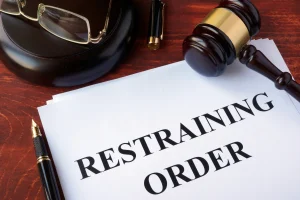Houston Family Law Attorneys Helping with Standing Orders During a Divorce
Divorce is a challenging time in anyone’s life, and understanding the legal complexities can feel overwhelming. Standing orders are a crucial component of the divorce process in Texas, providing stability and protection for both parties and their children. Farias Law Firm, PLLC, is dedicated to helping Houston families with standing or standing orders during a divorce. We are here to help you through this difficult time, offering experienced legal counsel, mediation services, and a client-focused approach.

Call us today at 713-226-7999 to speak with one of our family lawyers who will discuss and help you through your difficult family law matters. Remember, even in the midst of challenging times, there is strength within you, and with the support of dedicated professionals like Farias Law Firm, PLLC, you can emerge from this chapter with newfound resilience and a brighter future ahead.
Understanding Standing Orders in Texas Divorce
In Texas divorce cases, standing and standing orders are used to define the parental and financial rights and responsibilities of each spouse. They serve as protective measures for spouses, property, and children’s welfare. A proficient family law attorney can effectively guide you through these orders for an optimal outcome.
Standing orders are court-issued directives that automatically apply to both parties involved in a divorce case. These orders are meant to maintain the status quo and protect the rights and interests of all parties during the divorce process. They become effective as soon as a divorce case is filed and serve as standing rules until a final judgment is reached or the court issues further orders.
Standing orders or standing orders address various family law issues while the divorce case is pending, such as:
- child custody
- child support
- spousal support
- property division
In the event of a spouse disregarding standing orders, the court may impose a fine or imprisonment as punishment for contempt.
Here are some common elements covered by standing orders in Texas divorce cases:
- Property and Asset Restraints: Standing orders often include provisions that restrict both spouses from making significant changes to their financial situation, such as selling property or emptying bank accounts, without the court’s permission.
- Child Conservatorship (Custody) and Visitation: These orders may address issues related to child custody, visitation, and communication with the children. They aim to maintain stability and prevent unilateral actions that could impact the children’s well-being.
- Insurance and Expenses: They may include directives related to maintaining existing insurance coverage, including health and life insurance. Both parties might be prohibited from canceling or making significant changes to insurance policies without court approval.
Standing orders in Texas divorce cases vary by county, and not all counties implement them. In those counties where standing orders are in place, individuals initiating a divorce by filing a petition for dissolution or to establish conservatorship and child possession must include any relevant standing orders as attachments to their initial legal pleadings.
The Role of Houston Family Law Attorneys in Managing Standing Orders
Family law attorneys in Houston have a significant role in handling standing orders, encompassing the creation of requests and client representation at hearings. Ensuring a positive resolution during a divorce often requires the experience of a knowledgeable attorney who understands the intricacies of family law matters and can guide clients through the complexities of the divorce process.
At Farias Law Firm, PLLC, we prioritize our clients’ needs above all else, providing comprehensive legal support and guidance throughout the journey. Our commitment to your well-being extends to our approach in resolving disputes, as we will use negotiation and mediation first and will be prepared to take the case to court if needed.
Crafting a Standing Order Request
- Consult Legal Professionals:
- Before initiating the process, consult with divorce attorneys or legal professionals to understand the specific requirements and considerations for standing orders in your jurisdiction. Different jurisdictions may have specific guidelines for the creation and submission of standing orders.
- Identify Key Issues:
- Identify the key issues that the standing order will address. Common areas covered by standing orders include financial restraints, property division, child custody, and communication between parties
- Include Standard Provisions:
- Incorporate standard provisions that are commonly addressed in standing orders, such as restrictions on selling marital assets, financial disclosures, provisions for child custody and visitation, and rules regarding communication between the parties.
- Legal Review:
- Have the draft standing order reviewed by legal professionals, including your attorney. This helps ensure that the order is legally sound and compliant with local rules.
- File with the Court:
- File the standing order with the appropriate court. Follow the court’s procedures for document submission, pay any required filing fees, and ensure that you meet all deadlines.
- Serve Notice to Parties:
- Serve notice to the other party (your spouse) by providing them with a copy of the filed standing order. Proper service methods may vary, and compliance with service requirements is crucial.
- Court Review and Approval:
- The court will review the proposed standing order. If the court approves the order, it becomes effective and applies to both parties involved in the divorce case.
- Implementation and Compliance:
- Once the standing order is in effect, both parties are required to comply with its provisions throughout the divorce proceedings.
- Modifications or Challenges:
- Parties can seek modifications or challenge specific provisions of the standing order by filing appropriate motions with the court if needed.
Remember that legal advice tailored to your specific situation is essential during the creation of standing orders. Consult with your attorney to ensure that the standing order is suitable for your case and complies with local laws and regulations.
When formulating a standing order request in Texas, the following aspects are taken into account:
- The income and assets of each parent
- The number and ages of the children
- Child custody and visitation arrangements
- Child support and financial obligations
- Standing possession of property or assets
- Temporary restraining orders or protective orders
Avoidance of common mistakes in divorce proceedings can significantly contribute to achieving an optimal outcome. Some of these mistakes include:
- Insufficient preparation
- Failure to engage a well-informed attorney
- Neglecting comprehensive financial documentation
- Non-compliance with court orders
- Lack of understanding of the divorce process and legal prerequisites.
Responding to Standing Orders in a Houston Divorce

In Texas, the initial plea to the court should include a petition for standing orders. The court then schedules a standing orders hearing to decide on matters related to child custody, support, and other pertinent issues while processing the final order. To prepare a response for a standing order in a Texas divorce case, it is recommended to:
- Review the standing order
- Gather evidence
- Consult with an attorney
- Draft your response
- File your response
- Serve the other party
- Attend the hearing.
Legal counsel is instrumental when responding to standing orders, as they provide knowledge and guidance throughout the process. They can:
- Explain your rights and obligations under the standing orders
- Safeguard your interests
- Advocate for your desired outcomes
- Guide you through complex legal procedures
- Assemble requisite evidence
- Present your case persuasively in court
Having a knowledgeable attorney by your side can significantly improve your chances of achieving a positive conclusion when responding to standing orders.
Advocacy at Standing Orders Hearings
A skilled family law attorney can effectively present the most persuasive evidence within the given timeframe at standing orders hearings in family law cases.
A standing orders hearing in Texas is typically the initial hearing in a family law case, where a judge will review and potentially issue standing orders.
These orders are issued while the divorce process is ongoing. Generally, the hearing takes place within 14 days of filing a Motion for standing orders.
A family law attorney can assist their client in achieving a beneficial result at a standing order hearing by:
- Offering legal counsel
- Collecting evidence
- Constructing persuasive arguments
- Negotiating
- Representing their client’s rights and goals
In some cases, Houston standing orders may be consented to by the parties and submitted to the court without requiring a hearing.
Navigating Child Custody and Support with Standing Orders
Standing orders offer essential stability and safeguarding for children implicated in custody and support matters during a divorce. These orders ensure that both parties’ rights and responsibilities are established, and the children’s well-being is maintained during the divorce process.
Establishing a Temporary Child Conservatorship (Custody) Arrangement
When determining a child custody arrangement, Texas courts take into account the parent’s mental and physical health, lifestyle, any history of abuse or neglect, and the income and assets of each parent. In accordance with Texas law, a Houston family law attorney can provide support to a client in establishing a temporary child custody arrangement by guiding them through their rights and options, collecting evidence, engaging in negotiations, representing them in court, and cooperating with the court to implement the standing order.
In Texas, temporary child custody is a court-ordered arrangement that determines the custody and support of a child during the divorce process. It is an effective way to establish an agreement regarding child custody and support while the final order is being determined. Such orders can address issues such as visitation schedules, decision-making authority, and child support payments.
In Texas, parents have certain basic rights with respect to their children. These rights include:
- The right to make decisions concerning the child’s upbringing, including decisions regarding education, healthcare, and religious training.
- The right to access and possess the child, which means the right to spend time with the child and to have physical custody of the child.
- The right to receive information from any other person who has access to information about the child, such as teachers, doctors, or counselors.
- The right to consent to the child’s marriage, enlistment in the armed forces, and medical and psychiatric treatment.
- The right to receive child support from the other parent, if applicable.
It is important to note that these rights can be limited or modified by court order if it is determined to be in the well-being of the child. Additionally, if the parents are not married, the father may need to establish paternity before he can exercise these rights.
Calculating Temporary Child Support
Calculating temporary child support in Texas is based on the noncustodial parent’s net monthly resources. The law sets guidelines for the amount of child support based on the number of minor children. To calculate child support in Texas, the court considers the net resources of a noncustodial parent, which encompasses wages, salary income, and other income sources.
If a noncustodial parent has no income, child support is still calculated based on their monthly net resources. Consulting with a lawyer from Farias Law Firm, PLLC is significant in determining the appropriate amount of child support based on specific circumstances. We can aid in negotiating and calculating the proper amount of child support based on the unique situation of each case.
Addressing Spousal Support and Property Concerns

Addressing matters related to spousal support and property during a divorce is essential, given their substantial influence on both parties’ financial health. Standing orders related to spousal support and property protection can help to ensure that both spouses are treated fairly and that marital assets are preserved during the divorce process.
Securing Temporary Spousal Maintenance
In Texas, a spouse may be eligible for post-divorce spousal support if certain conditions are met. They must have been married for at least ten years, the paying spouse must have the financial means to provide support, and the requesting spouse must be unable to meet their necessary expenses. The court will evaluate a range of factors to determine if spousal support is applicable and the amount to be paid. Requesting the court to order payments during the divorce proceedings is the process for obtaining temporary spousal maintenance. Upon the finalization of the divorce, the temporary support will terminate, although the final divorce decree may include an order for continuing spousal maintenance.
A Houston family law attorney can offer experience and guidance on the relevant laws and regulations to assist with obtaining temporary spousal maintenance during a divorce. They can provide an understanding of the legal requirements and process for requesting standing spousal maintenance and help clients handle this complex aspect of their divorce proceedings.
Preserving Marital Assets
Standing orders serve to preserve marital assets during a divorce in Texas by establishing guidelines and maintaining the current situation until the case is resolved. These orders can prevent either spouse from taking steps that could diminish marital assets. They address immediate needs and ensure steadiness until a final divorce settlement or judgment is achieved. A variety of property may be included in such orders, such as automobiles, firearms, and pets. In assessing standing orders for asset protection in a divorce, courts consider elements including the duration of the marriage, tax implications, sources of future income, employability of either spouse and the income and assets of each spouse.
Farias Law Firm, PLLC can assist in preserving marital assets through standing orders during a divorce by:
- Assisting clients in requesting the court to issue standing orders and injunctions to protect the property
- Providing parameters for preserving marital property
- Preventing either spouse from taking any actions that could adversely affect the assets.
Modifying standing orders: Adapting to Changing Circumstances
Modifications to standing orders may be required due to changes in circumstances, especially if these changes substantially impact the welfare of the child or children involved. In such cases, it is crucial to seek legal counsel to ensure that your rights and security are protected. Farias Law Firm, PLLC can help you manage the complexities of modifying standing orders, offering guidance and support throughout the process.
You may file a Motion to Modify standing orders with the court if you wish to request a modification of standing orders. This document should be properly completed and filed with the court for the judge’s consideration. However, you must demonstrate that there has been a substantial change in circumstances. It is recommended that you consult with a legal professional prior to taking any action. It is advisable to present your case for a final hearing. This can lead to more beneficial outcomes. Obtaining legal counsel when adjusting standing orders is essential, as the process can be intricate and necessitates knowledge of the law.
Contact Farias Law Firm, PLLC for Guidance Every Step of the Divorce Process
Farias Law Firm, PLLC is dedicated to helping you through this difficult time, with a client-focused approach, tailoring the best resolution for you. Our team of experienced family law attorneys prioritizes our clients’ needs above all else, offering comprehensive legal support and guidance throughout their journey. Clients describe Farias Law Firm, PLLC as patient, smart, creative, hardworking, calm, and tenacious.
Contact us at 713-226-7999 for more information.We are committed to providing exceptional legal representation and a client-focused approach to help you navigate the complexities of standing orders during a divorce.
Frequently Asked Questions
Does Texas have standing orders for divorce?
Yes, Texas has standing orders for divorce which become effective upon filing and service of the other spouse.
What is a standinginjunction in a divorce in Texas?
A standinginjunction in a divorce case in Texas is a court order that sets rules and restrictions for both parties during the divorce proceedings.
Can standing orders be modified in Texas?
Yes, standing orders can be modified in Texas. If both parents agree, they can edit the agreed order. Otherwise, a motion to modify must be filed at the courthouse.
What is the purpose of standing and standing orders in Texas divorce cases?
Standing and standing orders in Texas divorce cases are designed to protect each spouse’s rights and responsibilities during the process, while also safeguarding property and ensuring the well-being of any children involved.
What is the role of a family law attorney in managing standing orders?
A family law attorney plays a critical role in managing standing orders, from drafting requests to representing clients at hearings to help ensure a positive resolution.

